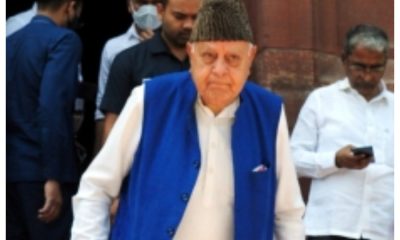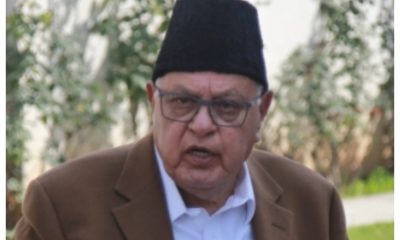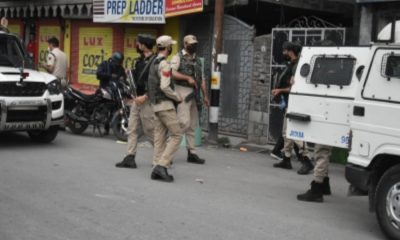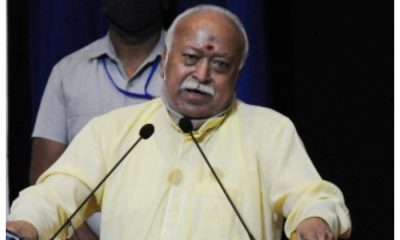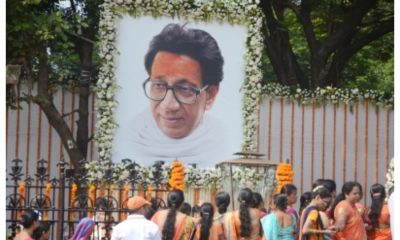National News
Why Farooq Abdullah is Villain No. 1 in the eyes of Kashmiri Pandits?
A majority of Kashmiri Pandits view Farooq Abdullah, the former Chief Minister of the erstwhile state of Jammu and Kashmir, as the main culprit behind the atrocities committed against them.
They believe that he was responsible for all the events that preceded the mass exodus of the minority community and the advent of terrorism in the Valley.
Farooq Abdullah was the Chief Minister from November 7, 1986 to January 18, 1990. It was this period which saw Kashmir gradually falling down the precipice, and despite warnings by intelligence agencies the indifference seemed insurmountable.
In February 1986, massive communal attacks occurred in South Kashmir. Muslim mobs looted and plundered or destroyed the properties and temples of Kashmiri Pandits.
Ghulam Mohammad Shah, the brother-in-law of Farooq Abdullah, was the Chief Minister then. He failed to curb the violence and called in the army to curb the mayhem.
His government was dismissed in March 1986 by the then Governor Jagmohan. It was reported that Mufti Sayeed, then a Congress leader, had instigated the violence as he was keen to be the Chief Minister and replace Shah.
Rajiv Gandhi was the Prime Minister then who later gave Sayeed a seat in the Rajya Sabha and also made him a Union Minister. In November 1986, after months of hectic parleys, Rajiv Gandhi and Farooq Abdullah signed an accord and the latter was reinstated as the Chief Minister.
It was this period that saw the build up to the pogrom.
Ramesh Raina, President (All India Kashmiri Samaj (AIKS), said, “This 1986-1989 period is significant in the history of Kashmir, which is often ignored. The exodus did not happen overnight. There was full preparation for this. Abudllah fooled the nation with this accord. You can say he was incompetent and he didn’t have any control, or you can say he was totally involved, knew everything and let things build up.”
Panun Kashmir leader Ramesh Manvat said, “Muslim Conference, the original avatar of ‘National’ Conference started as a group to fight for the rights of Muslims in Kashmir in 1930s; turned their tide against then Maharaja Hari Singh; nourished the dream of an Independent Kashmir (following their call of ‘Quit Kashmir’ in 1940s) — leading to the dismissal of its founder Sheikh Mohammad Abdullah in 1950s … The legacy of communal Muslim mindset and inconsistencies in National Conference’s approach towards minorities — Kashmiri Pandits and the ‘idea of India’ they represent have been carried forward by Farooq Abdullah, during his long reign as CM of J&K.
“Farooq Abdullah, as a tacit supporter of the happenings on the ground was busy playing golf and giving joy rides to Bollywood heroines, before finally choosing to run away to London when Kashmir was burning and a full-blown genocide of Pandits was taking place.”
Former Director General of Police of Jammu and Kashmir, Shesh Paul Vaid, tweeted on March 16: “Many people in the country do not know this #KashmirFiles fact: first batch of ISI trained were arrested by J&K Police but ill-thought political decisions had them released and the same terrorists later on led the many terrorist organisations in J&K.”
Vaid was the DGP of J&K from December 31, 2016 till September 6, 2018. He also added in his tweet: “Some of the notorious names: Mohammed Afzal Sheikh of Trehgam Rafiq Ahmed Ahangar Mohammad Ayub Najar Farooq Ahmed Ganai Ghulam Mohammed Gujri Farooq Ahmed Malik Nazir Ahmed Sheikh Ghulam Mohi-Ud-Din Teli. Could this have been possible w/o the knowledge of the Union Govt of 1989?”
The fact that the intelligence agencies had repeatedly been alerting about the hordes of Kashmiris, especially youth, crossing over to PoK for arms training, went largely unheard of.
A lot of kidnappings were taking place, especially of the government employees, a maximum number of them were Kashmiri Pandits, but no action was taken.
Threats were openly given in local newspapers, posters were pasted and hit-lists made, but the administration seemed lifeless. The then Governor Jagmohan had mentioned the situation to then Prime Minister Rajiv Gandhi through letters dated April 20, 1990.
“Need I remind you that from the beginning of 1988, I had started sending ‘Warning Signals’ to you about the gathering storm in Kashmir? But you and the power wielders around you had neither the time, nor the inclination, nor the vision, to see these signals. They were so clear, so pointed, that to ignore them was to commit sins of true historical proportions,” Jagmohan wrote in the letter.
His fear came true and the minorities and moderates had to bear the brunt even as Farooq Abdullah left the Valley for London soon after.
“Fifty per cent Kashmiri Pandits fled on January 19. It did not happen suddenly. Farooq Abdullah knows all. He has to answer,” said Ramesh Raina.
“Farooq Abdullah ran away to London while the Valley was burning. He was the founder member of Alfata, JKLF. While he was in chair, youth were freely transported to Pakistan through the LoC. How was it possible without his knowing?
“Why were terrorists being released from jail then? Why did he resign overnight and the next day the exodus happened? It was all planned because then all would have come to his head. So he resigned. But could the exodus have happened without a plot behind it,” he asked.
While Farooq Abdullah was in J&K, Mufti Mohammad Sayeed was the Home Minister at the Centre. His role as HM is also questioned by the community.
Surinder Kaul, the chief of Global Kashmiri Pandit Diaspora, said, “After we were forced to flee from Kashmir, we staged protests. I remember one meeting with then Home Minister Mufti Sayeed in 1990. All he had to say was ‘yes, this is not ok’.
“He had no answers to our questions. We told him, ‘why the local police and intelligence network had just vanished. Why was no one doing their work? Why was there no security’. But he just kept mum. That day I realised that the state and Central power system of our country had collapsed and no one was there to help us.”
“Farooq Abdullah has double standards. He always speaks one thing in Delhi and another in Kashmir. He never provided good governance. He protected the elite and never worked for the common people. To keep his fiefdom alive, he divided the communities. When Kashmiri Pandits were being killed, maimed, women were gang-raped, loot and arson had become the order of the day, where was he,” Kaul asked.
There have been times when Farooq Abdullah had borne the brunt of Kashmiri Pandits’ ire. In 2019, when he tried to meet a group of Kashmiri Pandits, who had come to Srinagar on a pilgrimage visit, he had to make a hastened retreat after slogans were raised against him.
Kashmiri Pandits feel that if Farooq Abdullah had taken strong steps, Kashmir would not have fallen to terrorism and the minorities would not have been tormented and forced out.
The community is seeking answers, and wants a judicial commission be instituted and Farooq Abdullah to be the first one to be investigated.
Crime
Palghar Crime: ATM Card Swapping Fraud Cracked In 24 Hours; Pelhar Police Arrest 25-Year-Old Accused, Recover Cash And Vehicle

Palghar, Maharashtra, Dec 25: Pelhar Police have arrested one accused involved in an ATM card swapping fraud and recovered cash and a vehicle used in the crime, successfully cracking the case within 24 hours of its registration.
The incident occurred on December 21, 2025, around 5:00 pm, when the complainant, Ramashankar Devkinandan Tiwari (53), a resident of Nalasopara East, visited an Axis Bank ATM at Vasai Phata to withdraw cash.
According to police, three unidentified men entered the ATM booth and engaged the complainant in conversation, claiming that their transaction had failed. Taking advantage of the distraction, the accused allegedly swapped the complainant’s ATM card through sleight of hand and handed him a different Canara Bank ATM card before leaving the spot.
The accused later used the complainant’s ATM card at another location to withdraw ₹50,000 from his bank account, thereby committing financial fraud.
Following a complaint lodged by the victim, Pelhar Police registered a case on December 22, 2025, under relevant sections of the Bharatiya Nyaya Sanhita.
During the investigation, the Crime Detection Unit examined CCTV footage from the ATM and nearby areas, which revealed that the accused used a Maruti Suzuki WagonR car.
Tracing the vehicle’s ownership and conducting technical analysis led the police to apprehend the accused, identified as Mohammad Afzal Mohammad Aslam (25), a resident of Ulwe, Navi Mumbai.
During interrogation, the accused confessed to committing the offence along with two accomplices. Police recovered ₹40,000 in cash from the accused, part of the defrauded amount, and seized the car used in the crime. The case was solved within 24 hours of registration.
The search for the remaining two absconding accused is ongoing. The arrested accused has been remanded to police custody until December 27, 2025.
National News
Maharashtra Politics: Thackeray Brothers’ Reunion Sparks Jubilation Among Shiv Sena-UBT & MNS Workers In Mira-Bhayandar

Bhayandar: Following the long-awaited confirmation of the alliance between the Thackeray brothers, which had the entire state of Maharashtra watching, an atmosphere of intense enthusiasm was seen among Shiv Sena and MNS workers in the Mira-Bhayandar area. The reunion of Uddhav Thackeray and Raj Thackeray after nearly two decades has triggered a wave of joy among party activists.
Against the backdrop of this historic development, Shiv Sena and MNS workers celebrated at the Golden Nest Circle in Bhayandar by distributing sweets, bursting firecrackers, and cheering in jubilation. The area resonated with slogans of “Thackeray Brothers Together.” Workers were seen dancing to the traditional beats of Dhol-Tasha.
Speaking on the occasion, activists stated that the alliance of the Thackeray brothers is a victory for Marathi pride (Asmita) and will have a significant impact on upcoming elections. They expressed confidence that the coming together of both parties would increase organizational strength and help address local issues more effectively.
Meanwhile, the political ripples of this alliance are being felt across Maharashtra, including Mira-Bhayandar. This partnership is being viewed as a crucial turning point for the upcoming Municipal Corporation and other elections. The reunion of the Thackeray brothers clearly signals the emergence of new equations in state politics.
Crime
ED raids Ruchi Group’s Indore, Mumbai premises; freezes assets, seizes cash in bank fraud case

Indore/Mumbai, Dec 25: The Directorate of Enforcement (ED), Indore Zonal Office, has conducted extensive search operations under the Prevention of Money Laundering Act (PMLA), 2002, at multiple locations in Indore and Mumbai, the investigation agency said on Thursday.
The raids on December 23 targeted premises linked to the Ruchi Group in connection with ongoing investigations into alleged bank fraud cases.
The probe stems from multiple FIRs registered by the Central Bureau of Investigation (CBI), Bhopal, against several Ruchi Group entities. These include M/s Ruchi Global Ltd. (now renamed M/s Agrotrade Enterprises Ltd.), M/s Ruchi Acroni Industries Ltd. (now M/s Steeltech Resources Ltd.), and M/s RSAL Steel Pvt. Ltd. (now M/s LGB Steel Pvt. Ltd.), it said.
The companies, promoted by the late Kailash Chandra Shahra and Umesh Shahra, are accused of orchestrating large-scale bank frauds through fund diversion, siphoning, and accounting manipulations, resulting in substantial wrongful losses to public sector banks.
The ED officials revealed that the investigation uncovered a sophisticated conspiracy involving the creation of numerous shell entities, the agency said.
These were used for round-tripping transactions, where spurious Letters of Credit and Cash Credit facilities were manipulated to divert funds for private gain.
Bogus sales and purchases were recorded, and deliberate losses inflicted to siphon off loan amounts obtained ostensibly for legitimate business purposes, it said.
Proceeds of crime generated from these frauds were allegedly concealed and layered to disguise their illicit origins.
During the searches, authorities froze bank balances exceeding Rs 20 lakh belonging to the accused persons and their family members. Additionally, cash amounting to over Rs 23 lakh was seized, along with significant incriminating documents and digital devices that establish the roles of the accused in the fraud, said the agency.
This action revives scrutiny on the Ruchi Group, which has faced prior allegations of financial irregularities.
Earlier CBI probes, dating back to 2021, had flagged similar issues in group companies, including a Rs 188 crore fraud case involving a bank consortium.
The current ED operation signals intensified efforts to trace and recover laundered assets, it said.
Further investigation is progressing, with sources indicating potential attachments of properties and deeper probes into the beneficiaries of the diverted funds.
-

 Crime3 years ago
Crime3 years agoClass 10 student jumps to death in Jaipur
-

 Maharashtra1 year ago
Maharashtra1 year agoMumbai Local Train Update: Central Railway’s New Timetable Comes Into Effect; Check Full List Of Revised Timings & Stations
-

 Maharashtra1 year ago
Maharashtra1 year agoMumbai To Go Toll-Free Tonight! Maharashtra Govt Announces Complete Toll Waiver For Light Motor Vehicles At All 5 Entry Points Of City
-

 Maharashtra1 year ago
Maharashtra1 year agoFalse photo of Imtiaz Jaleel’s rally, exposing the fooling conspiracy
-

 National News1 year ago
National News1 year agoMinistry of Railways rolls out Special Drive 4.0 with focus on digitisation, cleanliness, inclusiveness and grievance redressal
-

 Maharashtra1 year ago
Maharashtra1 year agoMaharashtra Elections 2024: Mumbai Metro & BEST Services Extended Till Midnight On Voting Day
-

 National News1 year ago
National News1 year agoJ&K: 4 Jawans Killed, 28 Injured After Bus Carrying BSF Personnel For Poll Duty Falls Into Gorge In Budgam; Terrifying Visuals Surface
-

 Crime1 year ago
Crime1 year agoBaba Siddique Murder: Mumbai Police Unable To Get Lawrence Bishnoi Custody Due To Home Ministry Order, Says Report



